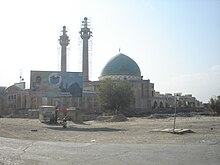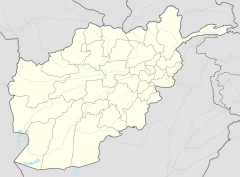
The Taliban insurgency began after the group's fall from power during the 2001 War in Afghanistan. The Taliban forces fought against the Afghan government, led by President Hamid Karzai, and later by President Ashraf Ghani, and against a US-led coalition of forces that has included all members of NATO; the 2021 Taliban offensive resulted in the collapse of the government of Ashraf Ghani. The private sector in Pakistan extends financial aid to the Taliban, contributing to their financial sustenance.
Events from the year 2011 in Afghanistan.
In 2006, 30 terrorist attacks, including 10 of a sectarian nature, took place, leaving 100 people dead and 230 others injured.

The Hazaras have long been the subjects of persecution in Afghanistan. The Hazaras are mostly from Afghanistan, primarily from the central regions of Afghanistan, known as Hazarajat. Significant communities of Hazara people also live in Quetta, Pakistan, and in Mashad, Iran, as part of the Hazara and Afghan diasporas.
This is a list of terrorist incidents in Pakistan in 2013. Some of the incidents are sectarian in nature and the TTP is responsible for a majority of them.

Malik Ishaq was a Pakistani militant, and leader and co-founder of the globally designated Lashkar-e-Jhangvi (LeJ).
The following lists events that happened in 2013 in Afghanistan.
The following lists events that happened during 2016 in Afghanistan.
Shia Muslims have been persecuted by the Islamic State, an Islamic extremist group, since 2014. Persecutions have taken place in Iraq, Syria, and other parts of the world.
Events in the year 2017 in Afghanistan.
A suicide bombing occurred on 21 March 2018 around 12:00 PM in Kabul near Kart-e Sakhi, a Shia shrine. At least 33 people were killed with more than 65 wounded in the bombing. The militant group ISIL claimed responsibility for the attack.

The Islamic State–Taliban conflict is an ongoing armed conflict between the Islamic State and the Taliban in Afghanistan. The conflict escalated when militants who were affiliated with Islamic State – Khorasan Province killed Abdul Ghani, a senior Taliban commander in Logar province on 2 February 2015. Since then, the Taliban and IS-KP have engaged in clashes over the control of territory, mostly in eastern Afghanistan, but clashes have also occurred between the Taliban and IS-KP cells which are located in the north-west and south-west.
On 8 October 2021, an ISIS-K suicide bombing occurred at the Shia Gozar-e-Sayed Abad Mosque in the Afghan city of Kunduz. Over 50 people were killed, and another 100 were injured, but according to an estimate by the United Nations Assistance Mission in Afghanistan, more than 100 people were killed and wounded.
Events in the year 2022 in Afghanistan.
On 21 April 2022, a powerful bomb rocked the Shia Seh Dokan mosque in Mazar-i-Sharif, Balkh Province, Afghanistan killing at least 31 people and injuring more than 87 others. The Islamic State – Khorasan Province claimed responsibility via Telegram.
On April 21, 2022, several separate explosions rocked different parts of Afghanistan. The first explosion occurred at the biggest Shia Muslim Seh Dokan mosque in Mazar-e-Sharif, Afghanistan. Over 31 people were killed and another 87 were injured in the mosque explosion. Another explosion targeted a vehicle exploded near a police station Kunduz city, leaving 4 dead and 18 injured. A mine planted explosion hit a van of the military in Khogiani killing four Taliban members and wounding a fifth. The roadside bomb wounded two children in the Niaz Beyk area of Kabul. Islamic State (ISIL) has claimed several attacks including the bombing of the Seh Dokan mosque.





